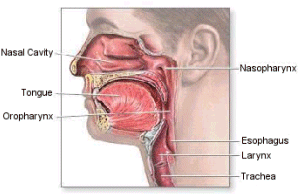A Feasibility Study to Evaluate Human Papillomavirus in Head and Neck Cancer Patients
Study Personnel
Principal Investigator: Carolyn Y. Fang, Ph.D., FCCC
Co-Principal Investigator: Jamie L. Studts, Ph.D.
Project Coordinator: Elizabeth L. Matera
Graduate Students: N/A
Study Synopsis:
Background: Although the role of certain types of human papillomavirus (HPV) in the origins of cervical cancer is well-established, the involvement of HPV infection in squamous cell carcinoma of other sites, such as the head and neck, is presently under extensive investigation. Prior research indicates that suppression of the immune system may contribute to the severity and progression of HPV-related lesions. Yet few empirical data exist on the prevalence of HPV infection in head and neck squamous cell carcinoma (HNSCC) or the ability to assess cellular immune response to HPV in this population.
 Objective: The objective of the proposed pilot study is to evaluate the feasibility of assessing HPV type in head and neck tumors and of measuring cellular immune response to HPV in a sample of patients referred for a definitive management of their HNSCC.
Objective: The objective of the proposed pilot study is to evaluate the feasibility of assessing HPV type in head and neck tumors and of measuring cellular immune response to HPV in a sample of patients referred for a definitive management of their HNSCC.
Specific Aims: Specific aims of the proposed feasibility study are: 1) to characterize the prevalence of HPV in tumors of the head and neck; 2) to evaluate cellular immunity to HPV in this population using lymphocyte proliferative assays (LPA) developed in prior studies and, 3) to examine potential moderators of cellular immune response, such as behavioral risk factors (e.g., tobacco and alcohol use) and psychological distress.
Study Design:The proposed feasibility study will use a cross-sectional design with one time point. Participants will be approximately 100 men and women referred for a definitive management of their HNSCC who have not yet started cancer treatment. Fifty of these participants will be identified locally through the James Graham Brown Cancer Center with the assistance of collaborating physicians. Individuals who agree to participate will be asked to complete a brief psychosocial and behavioral assessment and provide a blood sample for immunologic assays. A sample of cells will be obtained from the tumor site using a mouthwash rinse and, for some participants, from tumor tissue removed during surgery. Self-reported data to be collected include demographic variables, behavioral risk factors (e.g., tobacco and alcohol use), and psychosocial measures (e.g., distress, depression). Relevant immune measures include numbers and percentages of circulating lymphocytes in the peripheral blood, as well as T-cell proliferative responses to synthetic peptides derived from HPV16, a specific marker of immunocompentence and one that has been shown to be associated with viral clearance and disease regression. Finally, HPV type, comorbidity, primary site of the tumor, and TNM stage will be recorded. The identification of potential interrelations between HPV and demographic, behavioral, psychosocial, and immunologic variables may reveal new information about the potential mechanisms involved in HPV-related carcinogenesis.
Publications:
1.
2.
 Facebook
Facebook Twitter
Twitter Linkedin
Linkedin